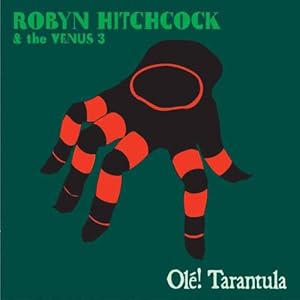The false intelligence, the expectation of military success, and the early sense of triumph and victory have given way to death, the bodies returning home with little ceremony, to increasing losses on both sides, to grief and bad memories, all recounted in Young’s “Shock and Awe,” with its propulsive, shimmery percussion, jangling guitar notes, and grief-filled horn, a song in which Young recalls, “We had a chance to change our mind, but somehow wisdom was hard to find.
Tag: music
Dissent is the Highest Form of Democracy: Michael Franti and Spearhead’s Yell Fire!
Yell Fire! is another chapter in Michael Franti’s career, another attempt to do work that expresses his personal sense of the world and his place in it. He is someone who does not quite fit common expectations: he is not selling our own greed and desire for glamour back to us, nor, though young and handsome, is he selling sex to us, or stupidity or hatred. He has invested in mind, sensitivity, and public concern; and his reward will be our awareness and our active—or activist—response.
Here We Are, On Earth Together: Stevie Wonder’s Talking Book
Femininity, Intelligence, and Power: Yoko Ono’s Yes, I’m A Witch
Yes, I’m A Witch is an important addition to anyone’s music library: it is of the past and the present, and infused with ideas about individuality and integrity, and feelings of defiance, community, and love, and the music sounds good!
The Spiritual Beauty of a Sensual Woman: Carly Simon’s precious collection Into White
However, I do not like her now simply because I liked her then. Into White is like a meal of fresh steamed vegetables, baked fish in a creamy sauce, with mineral water and white wine nearby, and the promise of sweet fruits and other desserts, after weeks of eating food offering empty calories and no nutrition. I am thinking not only of taste, and not only of value and use: I am thinking of worth.
I Dream for You: Meshell Ndegeocello, Bitter
 Meshell Ndegeocello is, to me, an interesting, neglected, and valuable talent. She spoke once of being surprised that her record company saw her as a failure. I am surprised by her surprise: we live in a world in which to be an artist or an intellectual is not the expected thing for a black person (rather one is expected to be too distracted by the fantasy of race and the rigors of reality for creative, independent endeavors). If you do not pull or push a plow, work for the post office, or stand in a pulpit telling pretty lies to women with their bibles and sometimes legs open, you have no ordinary purpose, no ordinary role.
Meshell Ndegeocello is, to me, an interesting, neglected, and valuable talent. She spoke once of being surprised that her record company saw her as a failure. I am surprised by her surprise: we live in a world in which to be an artist or an intellectual is not the expected thing for a black person (rather one is expected to be too distracted by the fantasy of race and the rigors of reality for creative, independent endeavors). If you do not pull or push a plow, work for the post office, or stand in a pulpit telling pretty lies to women with their bibles and sometimes legs open, you have no ordinary purpose, no ordinary role.
Head Full of Paradise: Robyn Hitchcock’s Ole! Tarantula
 Eccentricity is one of those facts, one of those strategies, that one appreciates most if there is some sense of reality as contrast: all eccentricity, all fantasy, can render a subject, or a man, merely irrelevant. On some songs, such as the title song “Olé! Tarantula,” Robyn Hitchcock might be offering clues as to how he himself might be seen: he sings, “I feel like a three-legged chinchilla” and “looking at his fingers caressing the keys, if he don’t please you, then you just can’t be pleased.”
Eccentricity is one of those facts, one of those strategies, that one appreciates most if there is some sense of reality as contrast: all eccentricity, all fantasy, can render a subject, or a man, merely irrelevant. On some songs, such as the title song “Olé! Tarantula,” Robyn Hitchcock might be offering clues as to how he himself might be seen: he sings, “I feel like a three-legged chinchilla” and “looking at his fingers caressing the keys, if he don’t please you, then you just can’t be pleased.”
The Gates of Hell Swinging Open: Mark Eitzel, 60 Watt Silver Lining
 Mark Eitzel’s voice is broad and deep without being loud, and his intonation is sensitive. “The view from the cliffs must have been exciting, and up to the peaks you were bound. Now you’re stranded alone, and the past is unknown, and there is no easy way down,” he sings, substituting “past” for “path,” before continuing: and the song captures aspiration, struggle, and spiritual reversal.
Mark Eitzel’s voice is broad and deep without being loud, and his intonation is sensitive. “The view from the cliffs must have been exciting, and up to the peaks you were bound. Now you’re stranded alone, and the past is unknown, and there is no easy way down,” he sings, substituting “past” for “path,” before continuing: and the song captures aspiration, struggle, and spiritual reversal.
Where Love’s Unwilled, Unleashed, Unbound: Madeleine Peyroux’s Half the Perfect World
Madeleine Peyroux’s Half the Perfect World is a good album and the collection’s first song “I’m All Right,” written by Peyroux with her producer Larry Klein and musician Walter Becker, is a funny-sad take on a love affair, and may be…
Brown Eyed Handsome Man, Music Pioneer: Chuck Berry’s After School Session
Resistance to other people’s self-serving solicitations, whether they involve work, school, or love, is the theme of “Too Much Monkey Business,” and Berry’s guitar rhythms are fast, repetitive, and (now) have the aspect of something classical, as if one were…